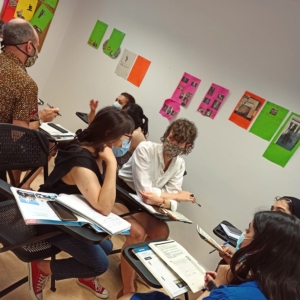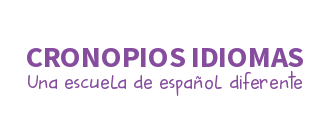Communicative Spanish classes
Learning Spanish in a Spanish-speaking country is a fantastic opportunity to practice directly with native speakers. It is recommended to combine a stay in Madrid with communicative Spanish classes. Many ELE students come to the classroom with a fairly good grammatical level but very limited oral expression, because they have hardly had the opportunity to speak to people whose mother tongue is Spanish.
What is a communicative approach in Spanish?
Although many language methods focus their efforts on the ‘what’, which is very important, it is useless if it is not related to a ‘for what’. For this reason, our communicative Spanish classes always end with an interactive activity where students can practice the contents explained that day to a real situation. And this is the way from the first day of classes.
How can someone communicate in Spanish when they barely know three words? It seems impossible, right? Well, there is no greater satisfaction for a teacher than seeing the happy face of their students when they discover that they can already spell their names thanks to a simple game after their first lesson. A little interaction and our students will believe they are the kings of the world!
This is the magic of the communicative approach that we believe in as teachers and that we try to put into practice in all of our Spanish classes. Does this mean that grammatical rules are not learned? Grammar is essential, but we prefer that the student knows at all times why they are going to need a specific content. After all, language is an instrument created with one objective: to communicate.

And how can we make our classes more communicative? My maxim is that we should take every opportunity for students to interact with each other, especially if one is shy and feels more insecure when speaking directly in front of others. Even in a boring or traditional activities, I try to have a minimum of oral exchange between them. For example, a simple “compare the answers with your partner” after an exercise already forces them, however little, to use Spanish for a communicative purpose. I think that I have not done a good job if all the students have not produced their own phrases during the Spanish classes.
What are you going to learn?
Any excuse is good to make our students speak Spanish, and getting it done successfully depends on well-designed activities. One of the dynamics preferred by my students, and that gives me very good results, is the phrase auction, a fun way to review grammar and vocabulary content before an exam, and ideal for any level. It is an individual or team competition in which you have to buy some sentences that the teacher writes on the board; But buying them is not easy: you have to guess if they are correct or not and, in this case, correct them properly. Simulating the procedure of a traditional auction, students have to bid with “imaginary money” to get the option to buy sentences. If you not find the mistakes in the sentences, you lose the money. The competitive factor is usually infallible and is a motivation for Spanish students to be encouraged to participate. In addition, it is not only useful to review specific content, but also to re-practice the high numbers that, at times, cost so much, or even develop strategies to justify your decision. This is the perfect example of how even a task as initially boring as the final review can be turned into a fun communicative activity.
One of the activities to practice the pasts in Spanish is the “battleship” game using verbs instead of letters and numbers to find the ships. This is a great way to repeat the forms and assimilate them without realizing it because you are playing, what you want is to beat your partner and you forget that you are practicing verbs.
Without thinking much about the form and more about the context, for the pasado perfecto, we can play at asking questions about implausible actions to find out the experiences that each one has had in her life. For example, if we use the question “have you ever …?” but with absurd situations, it is more fun: Have you ever flirted in a bar? Have you ever traveled alone? Have you ever missed a plane?
For the pasado indefinido, it’s a lot of fun to play tricky trivia games with group response options and compete with the opposing group. For example, if there is a student from South Korea and another from Italy, questions of this type can be asked: When was the Olympic Games in Seoul ?, when was the last time that Italy won a World Cup ?, etc. This game can be repeated with the past tense with the same type of questions such as: What was the name of the first woman president of South Korea ?, who was Julius Caesar ?, etc.
Obviously, the higher levels have fewer limitations and allow the design of more ambitious communicative Spanish classes. Role plays are ideal from B1, when students have a higher vocabulary and greater improvisation capacity. The idea of playing a different character from us is always attractive (since we are children we like to dress up) and provides extra motivation that can make students lose their fear of speaking. They are very grateful activities to put into practice colloquial expressions learned in class and improve intonation and pronunciation.
For example, to practice feeling verbs with a subjunctive, I use an activity based on the famous reality show Big Brother, where several strangers live together in a house. I give each student a character with a personality and they must act according to them. Once the situations are resolved, they must tell which partner they want to expel from the house and their reasons. An example: “I nominate Angel because I can’t stand him snoring at night”.
Of course, to get the most out of the communicative Spanish classes, participating in our cultural activities, socializing outside of school and speaking with natives are the best.



Leave a Reply
Want to join the discussion?Feel free to contribute!